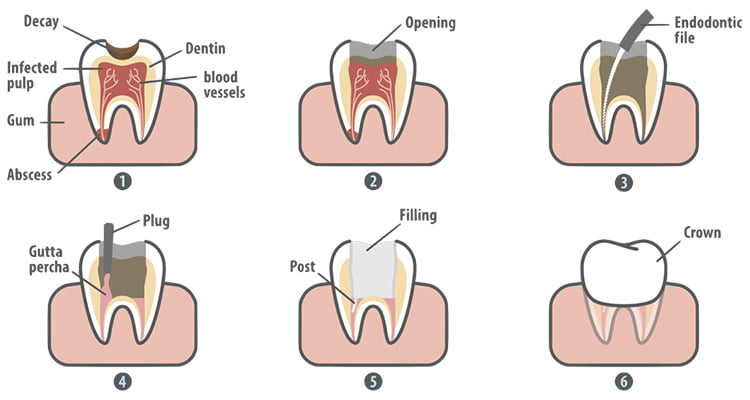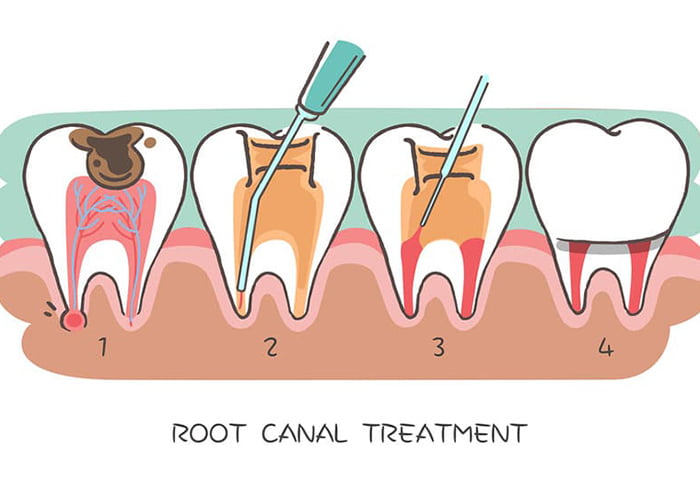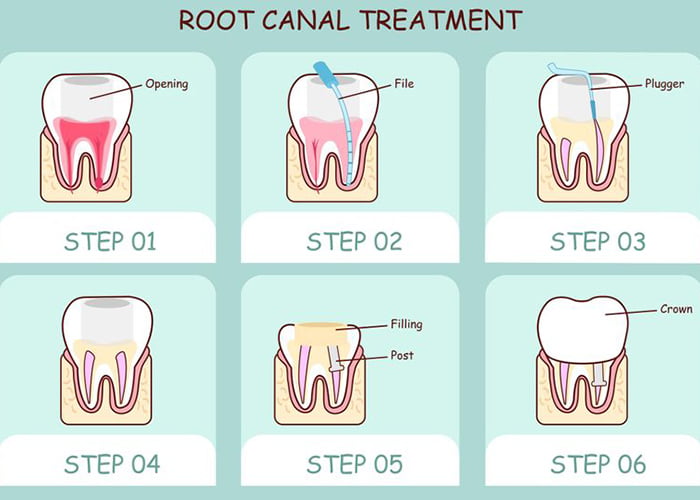Dental caries are the most common chronic diseases of childhood. They come in all shapes and sizes. Generally, it may be a consequence of inconsistent or inadequate hygiene habits. They can affect children from early childhood until adolescence. When left untreated, these conditions can lead to tooth loss and infection. Tooth decay is caused by an acidic diet and the bacteria in plaque. The bacteria produce acids that eat away at tooth enamel, which is made up of minerals. This causes the decay process to begin. Some people are more likely than others to develop oral infections as they age.
We work hard to improve your health and wellbeing, so we offer many solutions including fillings, root canals, crowns, and other oral health care.
With our state-of-the-art dental crowns, your results will be wonderfully discreet.

Advanced tooth decay or trauma may necessitate a root canal
The sticky coating on teeth is called plaque and can’t be seen by the naked eye. It gradually spreads throughout the mouth, carrying and intensifying the infection that harms various dental tissues, including the gums and eventually the jawbone.
If the decay isn’t treated, there’s a risk that it will spread and penetrate the tooth tissues. Either because of an advanced infection, or because of an injury, the pulp of the tooth may start attacking the interior of the tooth. The innermost part of your heart is called the pulp and it contains vital soft tissues like blood vessels, nerves and connective tissue. If the integrity of these tissues is jeopardized, it can lead to a slew of negative effects and could damage a tooth beyond repair.
So it’s important to know about the signs of a bacterial attack in your pulp, which may help you to prevent or control an infection. You might have a toothache when you bite into something or chew on it. A throbbing headache or a continuous pain in your jaw or cheek. Decay is a loss of tooth enamel caused by bacteria that eat away at the tooth’s outer layer.
The gums are also prone to infections and swelling. They may become enlarged, bumpy, or discolored. There are many causes for this, including diet changes, gum disease, stress, or simply being more active.
Will you need a dental crown after undergoing a root canal procedure?
Some degree of decay usually needs to be repaired before it can be restored through crowns. Some cases require root canals, but don’t let the phrase “root canal” fill you with fear. Modern dental science has made root canals easier, quicker and less painful than ever.
A root canal is a treatment to repair and save a tooth that is badly decayed or infected. The procedure involves removing the damaged tissue, cleaning and disinfecting the inside of the tooth, and then filling and sealing it. A dental crown may be needed after a root canal to help protect the tooth from further damage.
If you have a root canal, you may need a dental crown to help protect your tooth from further damage. During a root canal procedure, the damaged tissue is removed and the inside of the tooth is cleaned and sealed. If there is extensive damage to the tooth, a dental crown may be necessary to help restore it to its original shape and size. Crowns are also used to prevent teeth from breaking or splitting. If you have a root canal, talk to your dentist about whether or not you will need a dental crown.
There are a few key things that must happen before we can do this procedure. First, we need to numb the area with a local anesthetic. After filling the resultant space with medical-grade substance, we then seal it to provide structural integrity, disinfection, and additional sedative properties. If your tooth is damaged, you can restore it so that it looks beautiful, strengthen it against future trauma and then cap it with a lovely crown.

Avoid future complications and protect your oral health by scheduling an appointment today
The consequences of tooth decay can be serious. Not only throughout the mouth but throughout the body as oral infections have been linked to various systemic diseases.
This is especially true in children where the disease is more severe and the consequences even more serious. The most obvious consequence of tooth decay is the pain it causes. The other effects are less obvious, however, these may be more damaging than the pain.
See Dentist For Life
Looking for an experienced and trusted dentist in Marysville, Ohio? Look no further than Dentist For Life! We provide comprehensive dental care for patients of all ages. We take a wide variety of insurance plans and are currently accepting new patients. You can reach us at (937) 707-1111 or schedule your appointment online here.



